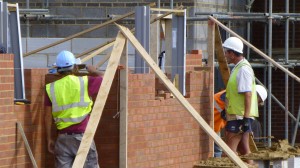 Hardly a person to let an opportunity slip to gripe about the perceived failings of the planning process and other woes of the house building industry, Redrow’s CEO Steve Morgan, is becoming a regular whinger whenever his company release results or issue interim statements to the City. His latest tirade this week concerned the release of greenbelt land for house building, capacity issues relating to labour and materials shortages and his perceived restrictive planning policies.
Hardly a person to let an opportunity slip to gripe about the perceived failings of the planning process and other woes of the house building industry, Redrow’s CEO Steve Morgan, is becoming a regular whinger whenever his company release results or issue interim statements to the City. His latest tirade this week concerned the release of greenbelt land for house building, capacity issues relating to labour and materials shortages and his perceived restrictive planning policies.
Reasons to be cheerful?
Morgan’s company Redrow released a record set of results and doubled the dividend paid to its shareholders on the back of a 91% increase in profits to £132.6 million for the year to the end of June. The average selling price of a Redrow home is also up 13% to £239,500 – the fifth highest of the large house builders. The number of new homes built was also 27% higher, up 727 to 3,597. All of this thanks to the government’s Help to Buy scheme, acknowledged by Redrow and facilitating over a third of their private sales (35%).
You would think this would make for a very happy bunny – especially when you consider that Morgan will be £3million richer as he owns 150 million shares in his company – but not apparently so.
On brick shortages:
According to Morgan, there are just not enough bricks being made to go round. Strange, as his competitors Barratt managed to build 13,663 new homes, nearly four times more than Redrow and Taylor Wimpey also managed to get bricks for the 11,600 new homes they built last year, again over three times the number Redrow built!
It takes around 10,000 bricks to build the average UK house. Around 1,560 million bricks were made last year – enough for 156,000 new houses. Nowhere near that number of houses will be built in 2014; in fact, it would be a surprise if a total of 156,000 new homes are built this year! So enough bricks are being made and Redrow’s competitors manage to order sufficient quantities so perhaps Morgan should be looking closer to home!
On labour shortages:
 For many years the building industry has not trained enough new tradesmen, not only to replace those leaving the industry, either retiring or turning their backs on site work and the boom and bust nature of house building. Much could have been done but little has been done. The CITB and apprenticeship schemes barely scratch the surface of the so-called skills shortage and are little more than PR window dressing for the industry. But it is not all doom and gloom, immigrants from Europe can and are filling the gap and Barratt manage to source sufficient labour to build over 13,000 new homes last year Mr Morgan!
For many years the building industry has not trained enough new tradesmen, not only to replace those leaving the industry, either retiring or turning their backs on site work and the boom and bust nature of house building. Much could have been done but little has been done. The CITB and apprenticeship schemes barely scratch the surface of the so-called skills shortage and are little more than PR window dressing for the industry. But it is not all doom and gloom, immigrants from Europe can and are filling the gap and Barratt manage to source sufficient labour to build over 13,000 new homes last year Mr Morgan!
Morgan said: “The shortage of skilled people in our industry is another obstacle to preventing increased output in line with demand. I am proud that Redrow continues to be at the forefront in training the next generation of skilled workers at all levels. During the year we have recruited 48 apprentices, 26 graduates and 8 technical trainees”
Really? Just 48 new apprenticeships is not going make any difference at all especially when Redrow as a company, only employ a total of 84 “across the divisions”. All the major house builders should be forced to invest at least 5% of their revenue on directly-employed apprentices in the trades professions, paying them at least the national minimum wage, or alternatively be given the option to opt-out of Help to Buy if they wish to avoid it.
On greenbelt land:
Morgan told the Daily Mail, “politicians should put a cold towel around their heads” and review the strict planning restrictions regarding land in the greenbelt, described by Morgan as “tatty land of poor quality on the edge of major conurbations which is deemed sacrosanct – I think that is wrong.”
This from a CEO of a plc house builder with 16,724 plots in its landbank, sufficient for nearly 5 years at current output. What he is really saying is, release the greenbelt for house building, which will increase the supply of building land. This in turn will lower the price of land and enable house builders like Redrow to increase their profit margins still further, even when the Help to Buy money tree is killed off. There are good reasons why the greenbelt is protected against development, it must remain protected, especially against the greed of developers and house builders.
On planning policies:
Morgan blames “restrictive planning policies which started appearing in the 80s and 90s and got worse in the 2000s” as a reason why Britain is not building enough new homes. But there are other reasons why house builders will never build enough new homes. Described by Morgan as a “slow and tedious process and represents the biggest single obstacle to increasing the number of outlets. We strongly welcome the opportunity to engage with the Government through the current “Technical Consultation on Planning” which focuses on numerous issues relating to the plan-led system. The consultation paper seeks to reduce the current red tape, which prevents a quick start on sites where planning has been obtained. This removal of unnecessary red tape is fundamental to increasing the number of homes built each year.”
This is not the first time the CEO of a national house builder has bemoaned the planning process. A year ago it was Berkeley’s Tony Pidgley followed a few weeks later by Morgan. Even builder’s lobby group the Home Builders Federation (HBF) joined in. Taylor Wimpey’s CEO Peter Redfern also had his say in October 2013. Then the serial whinger had another attack on the planning system as Redrow’s released its Interim Statement in November last year. It is therefore hardly surprising that the government is beginning caving in to pressure from the house building industry to reduce planning red tape. However, conditions such as Section 106 agreements; Community Infrastructure charges and affordable housing quotas are a very necessary part of the process. At the very least, it facilitates a claw back share of the increase in land values – planning gain – after planning approval to the good of the local communities affected by all new housing development.
Instead of being unnecessarily critical of the planning system, the house builders CEOs would be better occupied focusing on why Britain’s new homes are being built to low standards, specifications and are such poor quality. If they are unable to do this, perhaps they could at the very least, improve the after sales customer care for unfortunate buyers of UK new homes.





